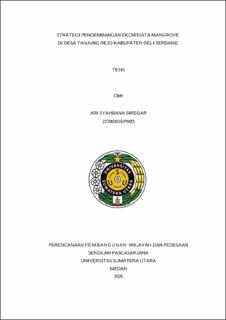| dc.description.abstract | Mangrove ecotourism offers a sustainable alternative for coastal development by
integrating conservation, community participation, and local economic
empowerment. This study explores strategic development opportunities for
mangrove ecotourism in Tanjung Rejo Village, Deli Serdang Regency, an area
recently designated as a mangrove tourism village. Using a mixed- method
approach, data were collected through structured questionnaires, stakeholder
interviews, and field observations. A SWOT analysis, supported by the Internal
Factor Evaluation (IFE) and External Factor Evaluation (EFE) matrices, was
applied to identify internal strengths and weaknesses, as well as external
opportunities and threats. Results indicate that Tanjung Rejo possesses strong
ecological assets and growing tourism interest but faces limitations in
infrastructure, institutional coordination, and promotional efforts. The analysis
revealed the most strategic quadrant to be Strengths–Opportunities (SO),
suggesting an aggressive strategy is appropriate. Recommended strategies include
improving tourism amenities, leveraging government and NGO partnerships, and
strengthening community-based management practices. The findings underscore
the importance of aligning ecotourism development with sustainable regional
planning, particularly in environmentally sensitive coastal zones. This study
contributes to the growing literature on community-based ecotourism in Southeast
Asia and offers practical guidance for policymakers, planners, and local
stakeholders aiming to balance economic benefits with mangrove conservation. | en_US |


